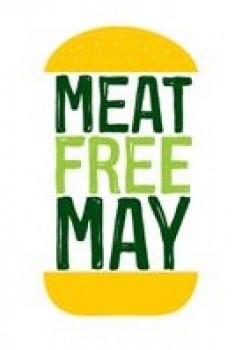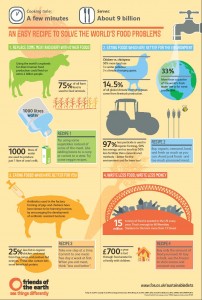
More evidence that low-calorie sweeteners are bad for your health
Studies show that artificial sweeteners can raise the risk of hypertension, metabolic syndrome, type 2 diabetes and heart disease, including stroke.

It’s not just May – it’s Meat Free May!
If you haven’t given much thought to reducing your meat consumption, now is the time to think about it.
Meat Free May is a great initiative from Young Friends of the Earth.
Meat and dairy production is responsible for nearly 15% of all global greenhouse gas emissions. And consumption globally is predicted to grow as incomes rise in the global south. Livestock production also uses as feed over a third of all crops grown and has a huge biodiversity and water impact.
Similarly, overfishing and destructive fishing methods are damaging our marine ecosystems. If we don’t reduce our already too high consumption in richer countries (around 84kg a week in the UK compared to 25kg in developing countries) – there will be huge consequences.
So we need to cut down on the amount of meat and fish that we eat and it’s not just campaigners who think so.
We all want to cut back
In a recent YouGov poll we did with the Eating Better alliance, a quarter of the British public say they have cut back on the amount of meat they eat over the past year. Only 2% say they are eating more. One in three (34%) say they are willing to consider eating less meat, with a quarter (25%) saying they have already cut back.
Ready meals, and processed meats are most likely to be off the menu. Awareness of the environmental impacts of meat has jumped from just one in seven people (14%) in 2007 to nearly one in three (31%) in 2013. And even MP’s have said we need to eat less meat.
A month without meat

There are lots of good reasons to cut down on meat. This handy infographic is part of the Eat Smart Action Pack from Friends of the Earth
That’s why Young Friends of the Earth are challenging you to take meat and fish off the menu for one month. Afterwards we hope you will find it easier to choose less and better meat, fish and dairy. And there are good options for more sustainable, higher welfare meat and fish.
It’s true that meat and dairy can provide valuable nutrients, the negative health and environmental impacts of over consumption are clear. Health-wise there’s an increased risk of chronic diseases such as coronary heart disease and some cancers with too much meat consumption, especially processed.
A great idea
It’s worth reading how Meat Free May came about; as a result of the Get Gobby competition Friends of the Earth ran for students in 2013 (and will run again in 2014).
Jannat Hossain won with her idea, but winning was not the end, as she says:
“I never wanted my campaign proposal to be simply another idea, dumped in a ..file somewhere never to be looked at again… I wanted to make [it] happen… to bring to life. I met Young Friends of the Earth at Basecamp in July 2013 and their way of working provided me with the perfect platform to bring together a group of people to work on Meat Free May.”
Better for you, better for the planet
Taking part in Meat Free May could help you start your journey towards eating better for yourself and the planet.
You can get started by downloading Eat Smart – a new guide from Friends of the Earth to promote healthier, sustainable diets locally in your communities, events, institutions and at work. INit you will find lots of tips to help you:
There are thousands of individuals and groups across the UK working on food projects – from school healthy eating programmes to major city-wide growing initiatives.
We thought they should have access to useful tools for promoting more sustainable diets – and eating less and better meat – in their activities.
So Friends of the Earth has produced the Eat Smart Action Pack: which includes handy tools such as:
Talking about what is in your diet is a great way to introduce people to wider issues and their total food footprint. If you are a campaigner this pack will help you promote these actions in a really positive way. And you may find people not as adverse to these messages as you may think!

Please subscribe me to your newsletter mailing list. I have read the
privacy statement